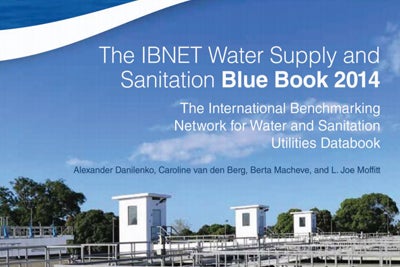 If you are working on an urban water project, what information do you need? You likely want to know what your project’s water utility knows. How else can you start talking to each other to have a productive discussion, using the same language and standards?
If you are working on an urban water project, what information do you need? You likely want to know what your project’s water utility knows. How else can you start talking to each other to have a productive discussion, using the same language and standards?
Our tool from International Benchmarking Network of Water Utilities (IBNET) provides a standard set of terms, data items and performance indicators to give a comprehensive picture of a water utility’s performance. It combines technical, social, financial and economic terms of water services into one language where all professionals, authorities and water utilities can understand each other.
Here’s an example of what we’ve seen can happen. The IBNET team went to Chittagong in February 2006 to meet with 32 Bangladesh water providers. At first, many asked why this information was needed and the providers had a long list of concerns about sharing data. Two days later the water providers saw how information sharing was critical and they were saying things like -- We want utilities to decide needs. We want utilities to think on the needed investments. We want to be accountable to our users through sharing data.
And today, this information has contributed to a better understanding of the sector by the government. Now, Dhaka Water Authority is reporting its results according to IBNET indicators. Investment programs in many utilities are tackling non-revenue water, intermittent water supply and water quality. And this is repeated in Moldova, Albania, Belarus, Vietnam, and is being built in Nigeria, Honduras, and Mozambique.
By delivering access to technical and financial information on utility performance, key stakeholders can do their jobs better: utility managers and employees can identify areas for improvement; governments can monitor and adjust sector policies and programs; investors can identify viable markets and opportunities for creating value; and customer groups and NGOs can exercise “voice” in an informed way. IBNET tools, such as data collection instruments and protocols, IBNET database, and IBNET tariff database, enable enhanced sharing of information.

This week, a new report was launched from IBNET finding that while water utilities around the world are able to provide water services to more people than previous years, the financial crises of 2008 and 2010 hampered utilities’ development and delivery of improved wastewater services, especially in poor urban areas.
The International Benchmarking Network Water Supply and Sanitation Blue Book 2014, which analyzed data from 4,400 utilities in more than 135 countries and territories, found that, despite difficulties, the sector overall showed continued signs of improvement, as municipal water utilities optimized operations over the past decade and as a result, were better able to withstand accelerated urbanization and the impacts of the triple crises of fuel, food, and finance. In addition, an increasing number of utilities now handle water billing, collection, and water management through metering, which is a shift in norms for utilities.
Improving service delivery requires information. We need to learn from each other, we need to help each other we need to teach each other. IBNET is one of many attempts to collect this information. Since 1997, IBNET has collected performance parameters of water and sanitation utilities. At www.ib-net.org you can find the performance report from all 5,000 utilities: from coverage and losses to costs, revenues, account receivable, collection rate and tariffs. By no means is it a comprehensive database. By no means is it fully representative. But with your help, we can expand it, maintain it and improve it.


Join the Conversation